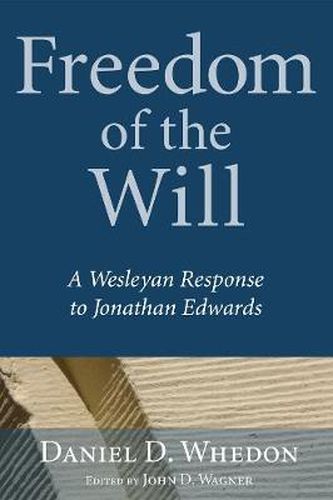Readings Newsletter
Become a Readings Member to make your shopping experience even easier.
Sign in or sign up for free!
You’re not far away from qualifying for FREE standard shipping within Australia
You’ve qualified for FREE standard shipping within Australia
The cart is loading…






This title is printed to order. This book may have been self-published. If so, we cannot guarantee the quality of the content. In the main most books will have gone through the editing process however some may not. We therefore suggest that you be aware of this before ordering this book. If in doubt check either the author or publisher’s details as we are unable to accept any returns unless they are faulty. Please contact us if you have any questions.
Is the human will in bondage to sinful motives, to the point that people cannot make truly free decisions? Daniel D. Whedon, a prominent nineteenth-century Wesleyan theologian, takes aim at this central thesis of the famed theologian Jonathan Edwards. In this new edition of his widely admired 1864 work, Whedon offers a step-by-step examination of Edwards’s positions and finds them lacking in Biblical and logical support. Within his position against Edwards, he argues that the difference between natural ability and moral ability is meaningless, that Edwards’s deterministic necessitarian argument makes God the author of sin, and that people frequently act against their strongest motives. He concludes that, without a free will, there can be no justice, no satisfying the moral sense, no moral Government of which the creature can be the rightful subject, and no God the righteous administrator.
$9.00 standard shipping within Australia
FREE standard shipping within Australia for orders over $100.00
Express & International shipping calculated at checkout
This title is printed to order. This book may have been self-published. If so, we cannot guarantee the quality of the content. In the main most books will have gone through the editing process however some may not. We therefore suggest that you be aware of this before ordering this book. If in doubt check either the author or publisher’s details as we are unable to accept any returns unless they are faulty. Please contact us if you have any questions.
Is the human will in bondage to sinful motives, to the point that people cannot make truly free decisions? Daniel D. Whedon, a prominent nineteenth-century Wesleyan theologian, takes aim at this central thesis of the famed theologian Jonathan Edwards. In this new edition of his widely admired 1864 work, Whedon offers a step-by-step examination of Edwards’s positions and finds them lacking in Biblical and logical support. Within his position against Edwards, he argues that the difference between natural ability and moral ability is meaningless, that Edwards’s deterministic necessitarian argument makes God the author of sin, and that people frequently act against their strongest motives. He concludes that, without a free will, there can be no justice, no satisfying the moral sense, no moral Government of which the creature can be the rightful subject, and no God the righteous administrator.